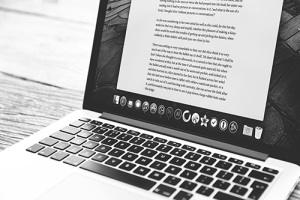6 Most Common Mistakes in Literacy Narratives
Telling a boring story
The core of a literacy narrative is the story you tell that explains some part of your literacy, the way you make sense of (some part of) the world. So, you want to make sure that you don’t tell a boring story. How do you avoid a boring story? Make sure you have plenty of exciting details, action, and dialogue.
You’ll want to make sure that you have at least one moment in your story that really comes alive. You want your reader to be able to live that one moment with you. So, instead of saying something general like, “When we were camping, we heard a bear outside our tent,” try to write something more like this:
Example
 I was startled from slumber by the noise of rustling leaves somewhere outside our tent. It didn’t sound like it was very close, but it was also close enough that my body immediately got tense and anxious. Lying there in my sleeping bag with my senses heightened, I tried to force my ears to gather more information about what might be outside. There was a full moon out, which caused the trees overhead to cast a few shadows on the top of the tent, so I was also waiting for the unmistakable outline of a bear to appear menacingly above me, paw raised, ready to strike and tear the canvas to shreds.
I was startled from slumber by the noise of rustling leaves somewhere outside our tent. It didn’t sound like it was very close, but it was also close enough that my body immediately got tense and anxious. Lying there in my sleeping bag with my senses heightened, I tried to force my ears to gather more information about what might be outside. There was a full moon out, which caused the trees overhead to cast a few shadows on the top of the tent, so I was also waiting for the unmistakable outline of a bear to appear menacingly above me, paw raised, ready to strike and tear the canvas to shreds.
See how you get to experience that moment along with me? It’s much more interesting than just saying that I had heard a bear outside my tent. Make sure you include a moment like that in your paper.
When you’re trying to decide which moment to expand, try to choose an important part of your story. It makes sense for the climax to be really drawn out with vivid details and action, but it doesn’t make a lot of sense to focus on a moment in the middle of the story that just doesn’t affect the outcome or how you changed.
Just telling a good story
Keep in mind that this assignment is a literacy narrative and not a short story. The biggest difference between a story and a narrative essay is that, in an essay, you analyze the meaning of the story or look at how it has affected you. Many students approach this paper as just a story, and so they tell their story and make it exciting and then they stop at the end and never say a single word about what it meant to them. That’s not a literacy narrative—that’s just a good story.
In your paper, make sure you have some reflection. You can add this along the way in several small chunks, like in a few sentences here and there, in a couple of paragraphs towards the end of your paper, after you finished your story, or in a single paragraph in your conclusion. Just make sure that you actually add the reflection into your paper. What does the story mean to you? How did it change you? What parts of your life right now exist because you went through this experience? How might your life have been different if you hadn’t gone through this? If you don’t discuss these things, you haven’t actually written a narrative essay.
Not stating your main idea
The biggest difference between telling a great story and writing a great essay is usually how it’s set up at the beginning. When you think of some of the great movies you’ve seen, you may think of some that withheld information from the viewer early in the story and then surprised them with it at the end. What?! The main character that spent all that time saving all those people at great risk to himself was actually a horrible guy who was just trying to find the person with the genetic code he needed so he could kill them to save his own life?! Gasp! I had no idea! That kind of surprise works really well for a movie or a book, but it’s terrible for an essay.
An essay usually makes it clear from the beginning what the point of the paper is. It’s typically stated clearly and directly in the introduction. These statements of your main idea, also called a thesis statement, should explicitly state an idea and not just talk about it. For example, don’t write, “I’m going to write about the time I got stuck in an elevator.” That mentions your story, but it doesn’t tell us what the point of the story is. Instead, write something like this: “Because of the hour I spent stuck in that elevator, I realized that it was time to give up my obsession with the ukulele.” Your main idea should give us a sense of what the purpose of your story is or how it changed you.
I find that most thesis statements for literacy narratives have some combination of three different elements of your story: the “before,” the moment of change, and the “after.” Check out these examples of good thesis statements from previous student literacy narratives and look for which of the three elements they contain:
Examples
- “I thought I hated poetry until I realized that the music lyrics I was writing were actually poems.”
That’s the before—I thought I hated poetry—and the moment of change—I realized that the music lyrics I was writing were actually poems; we don’t know what happened to the student after this realization, but we know we’ll find out when we read the paper.
 “I used to love reading until my ninth-grade speed-reading class; now, reading anything longer than a paragraph gives me anxiety.”
“I used to love reading until my ninth-grade speed-reading class; now, reading anything longer than a paragraph gives me anxiety.”
All three elements are present here: before—I used to love reading; the moment of change—my ninth-grade speed-reading class; and the after—reading anything longer than a paragraph gives me anxiety.
- “If it weren’t for Harry Potter, I probably never would have graduated high school.”
In this example, we get the moment of change—Harry Potter—and the after—I would never have graduated high school; we don’t know what the student was like before Harry Potter, but we know we’ll find out more as we read.
As you can see, almost any combination of or those three elements— before, the moment of change, and after—can produce a clear and effective thesis statement. Try writing down your before, your after, and your moment of change, and then experiment with different ways to combine them together until you find a clear statement of the main idea of your essay that you like. Add that to the end of your introduction, and make sure there’s a good flow from what you had before to your main idea, and you’re done.
Trying to make your paper about someone other than yourself
The literacy narrative is an essay that examines how one of your experiences has affected your literacy.[1] That’s it. Some students try to take their experience and turn it into a lesson for everyone else, but that’s not what this should be. If you gained some great insight into how other people should be treated because of what you experienced, then let that be the lesson—you learned something valuable. Don’t turn this paper into something that other people need to learn.
Remember the essay we read in class, “Rebel Music”? In that paper, Felsenfeld discovered classical music in a pretty interesting way that changed the trajectory of his life. Look again at the end of his paper. Did he try to convince everyone else that they should like the same music? Did he try to persuade his readers that they needed to be composers just like him? No. And that’s because his essay was simply about what he learned through his experience of discovering rebel music.
In your reflection at the end of your paper, try to resist the urge to make your essay about what other people should or shouldn’t do. Let the change you experienced be the focus of your writing, and let that be enough.
Not reading your paper before submitting it
 I can’t tell you how many papers I have received that I am convinced were never read by the author before they turned them in. I can say this, with confidence, because of the number of mistakes that continue to exist in the paper. I’m not talking about tricky mistakes, like picking the right “your” or “you’re.”[2] I’m talking about papers that have words like “aiw=sn” in them. I know that the authors never read their own papers because that word is simply not English. My own spell checker is freaking out at me right now because I left that word in there, so I know that the word processor the students used did the same. If that word continues to exist, then that means the student never even looked at their own paper after writing it. Please don’t do this.
I can’t tell you how many papers I have received that I am convinced were never read by the author before they turned them in. I can say this, with confidence, because of the number of mistakes that continue to exist in the paper. I’m not talking about tricky mistakes, like picking the right “your” or “you’re.”[2] I’m talking about papers that have words like “aiw=sn” in them. I know that the authors never read their own papers because that word is simply not English. My own spell checker is freaking out at me right now because I left that word in there, so I know that the word processor the students used did the same. If that word continues to exist, then that means the student never even looked at their own paper after writing it. Please don’t do this.
After you’ve finished writing your paper, set it aside for a day or more, and then come back to it and actually read it. Read it like you didn’t write it. Read it to see what you can learn from it. Along the way, see what jumps out at you because it’s awkward or repetitive or weird or underlined by your word processor because it’s not English. Take some time to make those awkward, repetitive, weird, non-English things better.
Giving your essay a title that’s not a title
The title of your essay is the name you’ve given your writing. A title like “Literacy Narrative” or “Essay #1” or “Title of your report” isn’t a title—that’s just what the thing is. That’s like writing a love poem called “Poem” for your crush. Can you imagine, taking this poem you poured your heart and soul into to your crush and asking them if you could read it? They’d say, “Awesome! What’s it called?” and your response would be, “It’s called ‘Poem.’” That would be it. Your One True Love would laugh and leave all because you gave your love poem a title that wasn’t actually a title.
 How would you react to meeting a girl named Daughter? Would you eat at a restaurant called American Food? Would you want to read a book called Adventure Story? Wear a perfume or cologne called “Good Smell”? What would your friends think about you if you unironically drove a car called “Automobile”? What if your preferred drink at the end of the day was a beer called “Beer”? Am I getting my point across?
How would you react to meeting a girl named Daughter? Would you eat at a restaurant called American Food? Would you want to read a book called Adventure Story? Wear a perfume or cologne called “Good Smell”? What would your friends think about you if you unironically drove a car called “Automobile”? What if your preferred drink at the end of the day was a beer called “Beer”? Am I getting my point across?
Every piece of formal academic writing, like this literacy narrative, should have a title, and that title should be interesting and related to the topic of your paper. I once read a paper that had a title like “Two Christmases,” and my initial thought was, “Oh, that’s interesting! Is this going to be a story about how much the student changed between one Christmas and the next?” As I started reading, I realized the paper was about the author’s parents getting divorced, so then I thought the title was even better because it clearly referred to spending one single Christmas at two different households. And then the student never mentioned Christmas in their paper even once. At the end, I was left confused and wondering why they had used that title in the first place. Don’t do that to your poor old professor.[3]
Not formatting your paper correctly
Most professors have rules about how they want your paper to look when you hand it in. Most of those professors will require you to follow one of the more popular academic styles like MLA or APA. Later in the semester, we’ll get into what those letters stand for,[4] but for now, you just need to know that you have to follow the rules of one of these styles.
If you don’t know what the rules are, don’t worry! In the instructions to the essay, I’ve included a link to a sample MLA paper[5] that you can use to help you figure out what you need to do. In that paper, there are lots of little comments near every important element of the writing style that you should have in your essay, so make sure you look them over[6] and apply all the relevant ones to your own writing. Then, make sure you’ve got all the right things in all the right places in all the right ways.
 If you have any questions about what’s required, you can always ask your instructor during office hours, during the writing studio time, or before or after class. You could also just write a message if you don’t have time for those other options. And if you can’t stand your professor,[7] the Writing Center is exceptionally good at helping students figure out how to format their papers.
If you have any questions about what’s required, you can always ask your instructor during office hours, during the writing studio time, or before or after class. You could also just write a message if you don’t have time for those other options. And if you can’t stand your professor,[7] the Writing Center is exceptionally good at helping students figure out how to format their papers.
Not using paragraphs in your writing
This one might seem a little surprising or farfetched, but every semester, I receive at least a few papers that are just one super long block of writing with no paragraph breaks in them. This can definitely make your paper harder to read, follow, and understand, so let’s review really briefly what paragraphs are and what they do for your reader.
A paragraph is defined pretty simply as a group of sentences that are organized around one single main idea. In other words, each paragraph is a chunk of text that is trying to communicate one thing. We separate paragraphs visually with an indentation in most academic writing styles, but online and in other styles, you might just use an extra line of space to split them up. Either way, these are visual clues for your readers that help them and their brains know how much text they have to process about one idea before they get to start thinking about a new idea.
When your essay is written as one big paragraph, you are not making it very easy on your reader. Instead of showing them that they have seven lines of text to connect together in their brain before reading a separate collection of eight lines that belong to the next idea, they simply have to figure out how your entire essay fits together with no help or clues or smaller chunks that are easier to interpret. It’s a lot for a brain to handle, and it can be quite daunting to take on. My average paragraph length in this section is a little under 100 words—that’s way easier to deal with than a full essay of 1000 words in a single paragraph. Please don’t do that to your readers.
- Still—your ability to make sense of some part of the world. ↵
- Or “there,” “there,” “they’re.” ↵
- “I’m 37! I’m not old!” Okay…I’m older than that, but it’s a good enough pop-culture reference that you should all know that it’s worth including it here. ↵
- #spoileralert—It doesn’t really matter, but they’re the Modern Languages Association and the American Psychiatric Association. ↵
- Called “Sample MLA Paper” because I’m super creative. ↵
- You could read the entire sample essay, but seriously, why would you? Just look at the comment boxes. ↵
- Who would blame you? ↵

